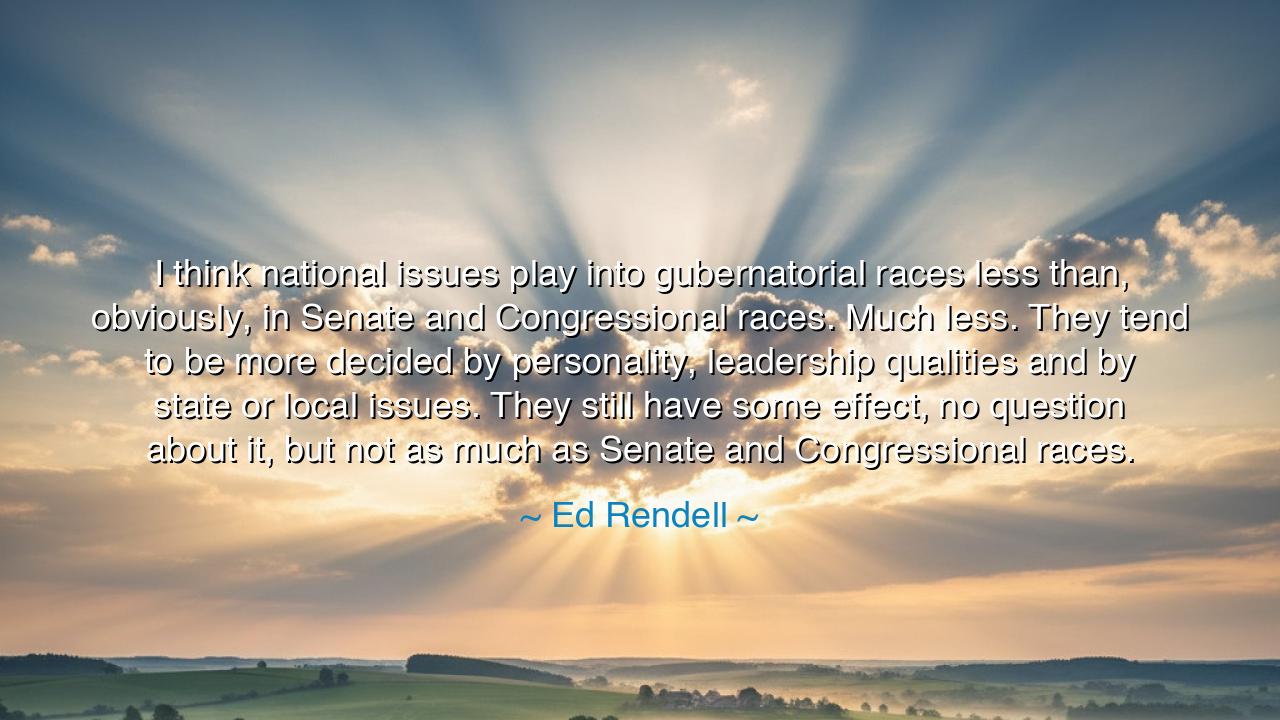
I think national issues play into gubernatorial races less than
I think national issues play into gubernatorial races less than, obviously, in Senate and Congressional races. Much less. They tend to be more decided by personality, leadership qualities and by state or local issues. They still have some effect, no question about it, but not as much as Senate and Congressional races.






Hear, O seekers of civic wisdom, the words of Ed Rendell, who declared: “I think national issues play into gubernatorial races less than, obviously, in Senate and Congressional races. Much less. They tend to be more decided by personality, leadership qualities and by state or local issues. They still have some effect, no question about it, but not as much as Senate and Congressional races.” In these words lies a truth about the nature of politics: that power is not one single flame burning across the land, but many fires, each rooted in the soil of its people, each rising or falling by the winds of place, time, and character.
The meaning of this saying is clear. While national issues—wars, great debates, or crises—can shape the contests for Senate or Congress, where policy is forged for the nation as a whole, the gubernatorial race remains closer to the people’s hearth. It is less about distant struggles in Washington and more about the daily bread, the roads beneath the people’s feet, the schools where their children learn. The governor is judged not so much by ideology alone, but by personality, by leadership qualities, and by whether they understand the heartbeat of their own state.
History offers us examples. Consider the rise of Fiorello La Guardia, mayor of New York City during the Great Depression. National debates about the economy raged in Congress, but what endeared La Guardia to his people was his directness, his compassion, his willingness to read comics on the radio to children when newspapers were on strike. His leadership qualities and his touch with local issues mattered more than his position on the national scene. In him, the people saw not merely a politician, but a guardian of their city’s spirit.
So too did Sam Houston in Texas embody this truth. While the Senate wrestled with great national struggles, Houston’s gubernatorial leadership was judged by his ability to navigate the particular identity of his state, balancing independence with unity. His decisions, sometimes controversial, were rooted not in national tides but in the soil of Texas itself. Thus Rendell’s words echo through the ages: the closer the office is to the people, the more its fate depends upon the personality and vision of the one who seeks it.
The origin of Rendell’s reflection lies in his own experience as governor of Pennsylvania, where he learned that citizens care deeply about local issues—about jobs in their towns, about their schools, about the safety of their communities. Though national debates influenced the air around them, the decisive weight rested upon whether he could deliver results close to home. The Senate may speak of great wars and treaties, but the governor must answer for potholes, power grids, and hospitals. The grandeur of the nation matters, but the intimacy of the state defines the race.
The wisdom here is luminous: true leadership must always meet the people where they are. It is not enough to echo national slogans or abstract policies; a leader must show their face, extend their hand, and address the needs of the soil they walk upon. Personality matters because it embodies trust; local issues matter because they shape the daily lives of the governed. This is not to deny the pull of national struggles, but to affirm that democracy breathes through many lungs, not one alone.
The lesson, O listener, is this: when you choose leaders close to you—your governor, your mayor, your council—you must weigh not only their words about the nation, but their deeds for your community. Ask whether they understand the burdens you bear, whether their leadership qualities inspire confidence, whether their character earns your trust. In turn, if you yourself are called to lead, remember that the nearer the office, the greater the duty to listen, to act, and to serve.
Thus remember the words of Ed Rendell: “National issues may sway the Senate, but gubernatorial races are decided by personality, leadership qualities, and local issues.” Let this truth be a guide: politics is not a single battlefield but many, and in each, victory belongs not to those who speak the loudest of distant matters, but to those who see and serve the people nearest to them.






AAdministratorAdministrator
Welcome, honored guests. Please leave a comment, we will respond soon